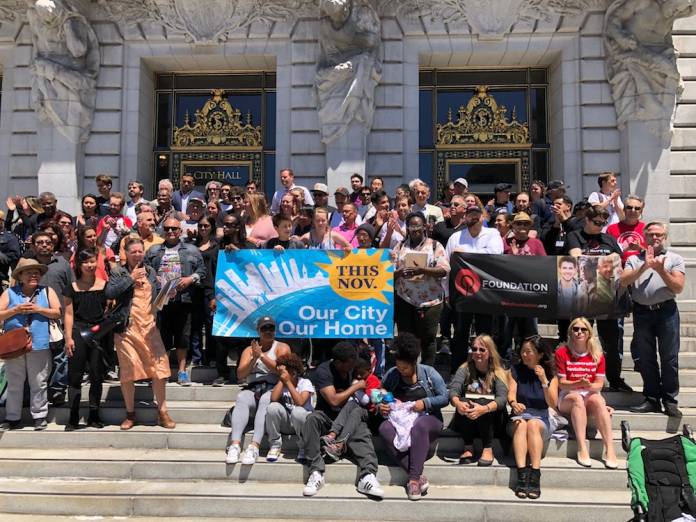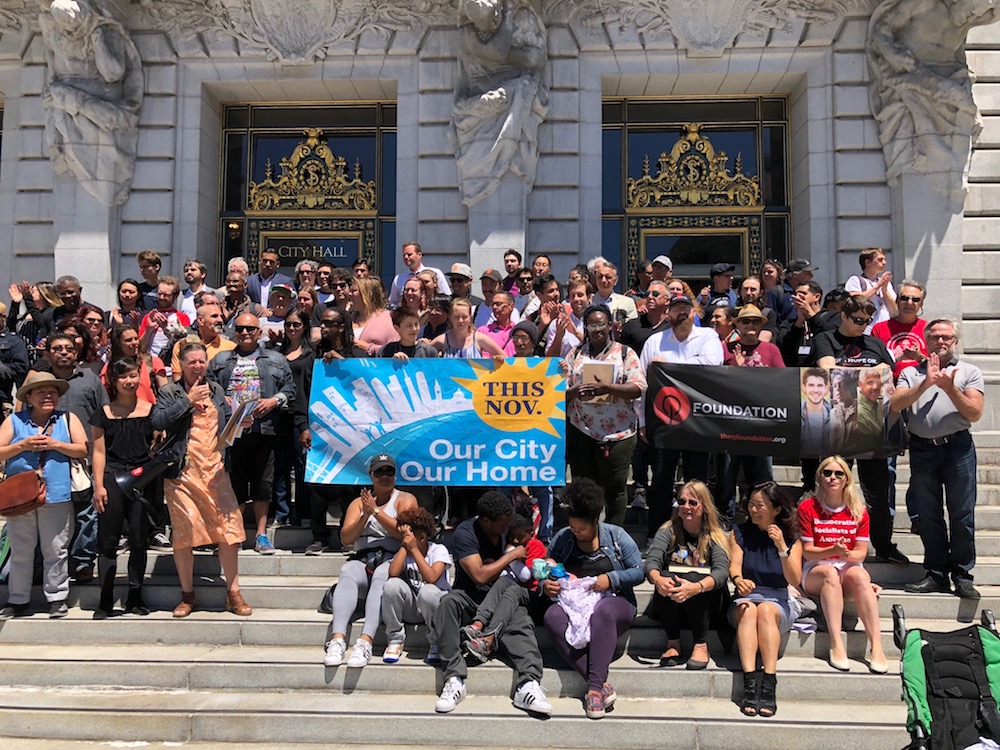
The most important measure to address homelessness in San Francisco in years now has a ballot designation: It’s Proposition C.
And on the state level, voters will be able to weigh in on a measure that could have just as big an impact on homelessness: Proposition 10, which would allow cities to impose effective rent controls.

Already, the landlords and their allies are attacking both. A memo from the city’s Office of Workforce and Economic Development argues that Prop. C would drive middle-class jobs out of town – which is not only nuts but defies the mission of OEWD. The tax would impact overwhelmingly companies that just got a big Trump tax break – and the idea that a minor additional fee on their massive gross receipts would cause them to move defies all history and evidence.
Of course, the conservatives at City Hall and their allies at the Chamber of Commerce are saying that we already spend a lot of money on homeless services – which is true. But while I often disagree with Randy Shaw, his report on how that money is spent is absolutely clear and accurate:
Despite story after story going back at least two decades, many still fail to understand that the bulk of the city’s homeless budget serves those already housed, not those now on the streets. As I wrote in 2014, “Since the 1980’s, the media has created an impression—now shared by the public and some supervisors—that you can simply divide homeless spending ($165 million) by the homeless numbers (7000) and then give that amount of money (over $20,000 per homeless person) to get them off the streets. But most of SF’s “homeless budget” is spent on people already housed. The city is not spending $165 million on 7,000 reported homeless, but on thousands more living in supportive permanent housing.That leads to the importance of state Prop. 10.
Over the past decade, San Francisco has spent a lot of money, and made considerable strides, in getting homeless people off the streets and into housing. But the problem keeps getting worse.
Why? Because for every homeless person we house, someone who used to have housing in the city becomes homeless.
Remember:70 percent of the homeless people in San Francisco used to have a home in San Francisco. They lost that home because of eviction – one way or another. They lost a job and couldn’t pay rent. They were Ellised out. The rent went up because they weren’t under rent control. They have disabling health conditions.
What the folks at City Hall have failed to see for all these years of the tech boom is that the Hippocratic Oath (well, the recent interpretations) needs to apply to the housing crisis: First, do no harm.
Help us save local journalism!
Every tax-deductible donation helps us grow to cover the issues that mean the most to our community. Become a 48 Hills Hero and support the only daily progressive news source in the Bay Area.
Put another way: When you are stuck in a ditch, quit digging.
Two facts that are at this point self-evident: Addressing homelessness in San Francisco is going to cost a lot of money, and that’s going to have to come from the wealthy in San Francisco. There was a time, back before Ronald Reagan, that the budget for the federal Department of Housing and Urban Development, which paid cities to build public housing, was bigger than the budget for the Department of Defense.
Reagan gutted HUD funding for cities – and no Democrat, not Clinton, not Obama – ever put that funding back.
The State of California could allocate huge amounts of money for non-market social housing – but Gov. Jerry Brown was never interested and I have heard nothing from our next governor, Gavin Newsom, on the topic. Sacramento still thinks that the private market will solve the housing crisis.
So San Francisco needs a large, reliable, consistent stream of revenue for housing – affordable housing and supportive housing for homeless people – and it’s going to have to be local. Prop. C represents the best thinking of a lot of people who have been dealing with this issue for many years; The Chamber of Commerce has yet to come up with a credible alternative.
Second: It will be increasingly difficult and expensive to solve this crisis unless we can keep existing residents in their homes.
Which brings me to the Yimbys.
Joe Fitz at the Ex has a fascinating story about the Yimby movement trying to figure out where to come down on Prop. 10.
The landlords, of course, argue that rent control discourages the construction of new housing. That would give the Yimbys, who think that all new housing is good and that any attempt to limit it is bad, a reason to oppose Prop. 10.
There is, to be polite, no credible evidence for that argument at all.
Prop. 10 doesn’t require any new rent control. All it does is allow cities to impose effective controls – if they want to.
It’s a pushback against the pattern we have seen for decades in California: The state likes to put all kinds of mandates on local government, and then take away the ability to mitigate the impacts.
Some cities used to have rent controls on vacant apartments; the policy worked well in Berkeley, Santa Monica, and West Hollywood. The housing stock didn’t deteriorate, but tenants got to stay in their homes.
Then in 1995, the state passed the Costa-Hawkins bill that made real rent control illegal.
All Prop.10 would do it return the rules to where they were before Costa-Hawkins; cities could impose rent controls on vacant apartments and on new buildings – if they decide to.
Some cities might not have the housing crisis that we have in San Francisco, and the elected officials there can simply leave things the way they are.
But there’s no way rent controls on vacant apartments – also called vacancy control – will have any impact on new housing construction in San Francisco.
The only kind of new housing that is getting built right now in San Francisco is high-end condos and rentals. The developers aren’t going to stop building just because the rents have to be stable in the long term; they are all financed by speculative capital that’s looking for a quick return. Rents are set at a level that allows the developer – now, today – to return enough money to pay the financiers, pay the taxes and maintenance, and make a nice profit. It those rents were too low to do that, the investors wouldn’t have put up their money in the first place.
And let’s remember: once a building is constructed in California, the property taxes never go up by more than a small, predictable amount.
(Oh, and by the way: San Francisco doesn’t impose rent controls on anything built after 1979. Under Prop. 10, the city could change that – or not.)
So if the Yimbys have any sense of the real economics of housing, they will have no choice but to agree that Prop. 10 won’t have any impact on new construction.
It would, on the other hand, have a huge impact on homelessness, but providing cities like SF with the tools to keep people in their homes.
For elected officials like Scott Wiener, David Chiu, Phil Ting, London Breed, and all the supervisors and candidates for supervisor, these are critical issues – and where these folks come down on Prop. 10 and Prop. C will define where they really stand on housing issues.
It’s a pretty simple calculus: Every legitimate tenant group and nearly every community-based housing or organizing group in the city supports Prop. C. The Chamber of Commerce and the landlord groups oppose it.
After this campaign, it will be much easier to define who is and isn’t a progressive in local politics.
